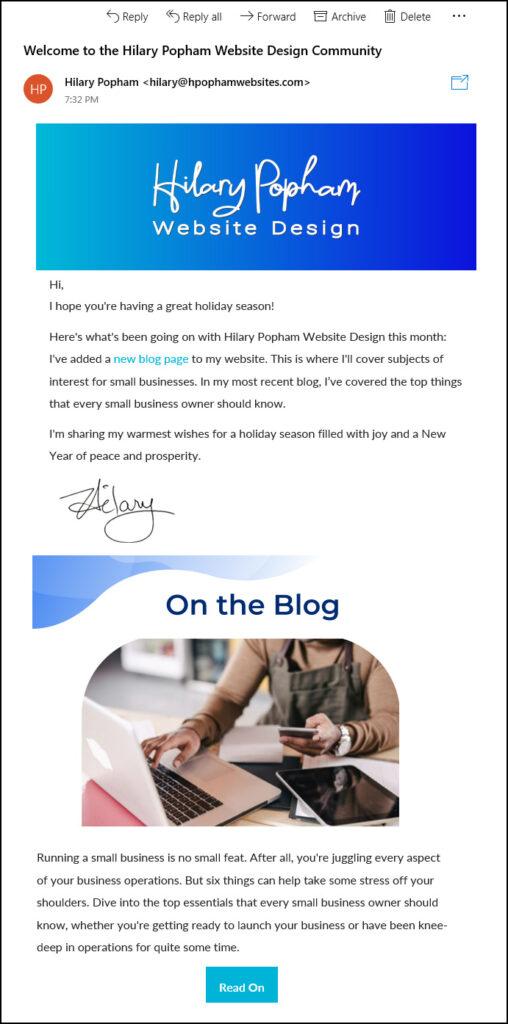Are you considering starting a small business? Stepping off the corporate ladder and stepping onto your own path can be exciting. After all, you’ll be able to choose everything, from when you wake up to where you work and how you’ll manage things. But starting a small business can also be a bit daunting. After all, there’s no one-size-fits-all manual that walks you through every nuance. But there are some general questions that small business owners should ask themselves before delving in.
Questions to Ask Before Starting a Small Business
Below, you’ll find 18 questions I wish I had known before starting my small business, Hilary Popham Website Design. Of course, I had to learn these tasks first-hand, but I want to give you a leg up on your small business dreams. By starting with this framework, you can easily give yourself a jump start on knowing exactly who your target market is, how you’re legally structuring things, organizing plans for your daily operations functions, and much more.
Which Services or Products Will Your Small Business Offer?
- Have you thought through what your service or product ideas will include?
- Have you done your market research for competitors, pricing, and audience?
- Have you crunched the numbers for the gross and net costs of your services or products?
Have you considered what you’ll be selling? Perhaps you’ve floated the idea of offering specialty yard maintenance services or personalized meditation recordings. Now is the time to dream big!
Creative Exercise to Work Through Your Services and Product Ideas
Grab a pen, a paper pad, and your phone timer. You’ll want to set aside one hour for this creative exercise. First, set the clock for 15 minutes and let your creativity flow. Next, write down all the ideas that your small business could offer. Don’t limit yourself but instead, work to fill your page. If you’ve already chosen an idea, use this exercise to work through what your services or products will entail. Once the timer goes off, take a good look at your list. Circle your top answers and add them to a fresh new page.
Reset your timer for another 30 minutes and use this second page to work through your target market. Use one persona and narrow it down to one fictional character. Add in their demographics: Male or female? Age range? Married or unmarried? In school or at work? Do they have kids? What do they do in their free time? What are their challenges? How could your offering help them? Once you work through the specifics, do some research on your computer. Look for other local (or national) competitors and see how they talk to their ideal customers. Use their approach as inspiration as you work through your ideas.
Lastly, reset your timer for 15 minutes. Then, open to a new page and start working through the numbers. What will it cost you to produce your services or products? What could you charge that would be in line with your competition and about two-thirds more than your production cost? I’ll be talking more about finances in the next section, but for now, start thinking about the big picture of expenses you’ll need to consider for starting your small business.
How Will You Handle Your Small Business Financials?
- Are you planning to open a separate business checking and savings account?
- Have you filed for an Employer Identification Number (EIN)?
- Are you handling your own bookkeeping, using software, or hiring out?
Now that you’ve worked through services and product ideas, now is a great time to expand on that last section of your brainstorming. Open your paper pad to a new page and add the questions from this section. Then, make a plan to contact your bank and add it to your calendar. You will need to have an Employer Identification Number first in order to open a business bank account. Visit the IRS’s website at https://www.irs.gov/businesses/small-businesses-self-employed/apply-for-an-employer-identification-number-ein-online for more information about getting an EIN.
While you’re mulling over business financials, you’ll want to ask yourself if there are essentials you’ll need to get started. Use your paper pad to add a list of wants and needs. Think through everything you’ll be using daily, weekly, monthly, and yearly. Keep this list handy and add to it over time. Then, when your small business grows, you can start crossing off wish list items one at a time.
Pro Tip for Small Business Financials
Keep in close contact with your tax professional and ask about deductions. For example, are you working from a home office? There’s a deduction for that. Are you traveling to meet clients or complete work projects? You can deduct that too. Are you using your personal cell phone for business? A portion of your cell phone bill can also be a business expense. Another great resource I recommend for researching business expenses is two of NOLO’s reference guides: Tax Savvy for Small Business: A Complete Tax Strategy Guide and Working for Yourself: Laws and Taxes for Independent Contractors, Freelancers & Gig Workers of All Types.
When you start doing research now, you’ll give your small business the gift of time. This is especially important as your task list begins to fill up.
What’s the Legal Structure of Your Business?
- Do you know which city and county licenses and credentials you’ll need?
- Have you considered which structure you’ll be using for your business?
- Have you checked with your tax professional about how to file business taxes?
No matter your industry, just about every small business operating in the United States is required to have at least one license. Two of the most common license to ask about are city and county licenses. I live in Bend, Oregon, so in my case, I needed to apply for a Bend City Business Registration and a Business Identification Number (BIN). Currently, the state of Oregon does not require new businesses to file for a state license. Depending on your business structure, you may need several credentials.
How Will You Be Operating Your Small Business?
- Will you need a brick-and-mortar storefront? Could you work from a home office or on the road?
- Will you need a loan to get started, or could you cash flow your small business?
- Have you thought through how you might handle an emergency or a situation where you’d have to step away from your small business?
Chances are that while brainstorming your services or products, you already envision where you’ll be selling them and how you’ll operate your small business. Now is the time for you to delve into these logistics fully.
How Will You Be Managing Your Small Business?
- Will you be working alongside a business partner, manager, or employees? If so, will they be full-time W2 employees, part-time employees, or contractors?
- Who will be managing the day-to-day operations? What are the communication tools you’ll be using to make sure everyone is on the same page?
- Who in your network could you contact about general small business questions?
Along with operations, you’ll also want to give some extra thought to the management side of your small business. For example, do you have a team you’ll be working with, or are you a sole proprietor? For small businesses utilizing teams, owners will especially want to ensure the lines of communication are open; This includes finding tools that help ensure everyone is on the same page.
Also, you’ll want to reach out to your network. You never know who owns a small business, and it could help give pointers as you start your entrepreneurial journey. From your hairdresser having an excellent product photography recommendation to your dental hygienist’s sister celebrating her 10th year owning her small business, you can find a trove of resources from the people you’re connecting with every day.
How Will You Be Marketing Your Small Business?
- Will you be building your small business website yourself or hiring out?
- In addition to your website, are you planning to market your business on Google Business Profile or social media? Could you collaborate with industry experts on podcasts, blog posts, or social media?
- For geographic-specific small businesses: Have you connected with your local chamber of commerce and other local networking groups? For non-geographical-specific small businesses: Are you planning to pursue accreditation programs like the Better Business Bureau?
Lastly, you’ll want to work through how you plan to market your small business. If you’re starting marketing on a shoestring budget, the best place you can start is with a professional business website. As detailed in a recent blog, having a website for your small business is essential in today’s tech-savvy world. It gives your small business credibility, helps attract new customers, gives you ownership over data and analytics, and saves time and money. But if you’re not comfortable with technology, building your own small business website can take time and effort.
That’s where I can help. At Hilary Popham Website Design, I’ve been creating professional websites for small businesses just like yours for the past 20 years. I specialize in technical website development, custom graphic design, and quality written content. And I work with each client to make their website exactly what they’re hoping for.



